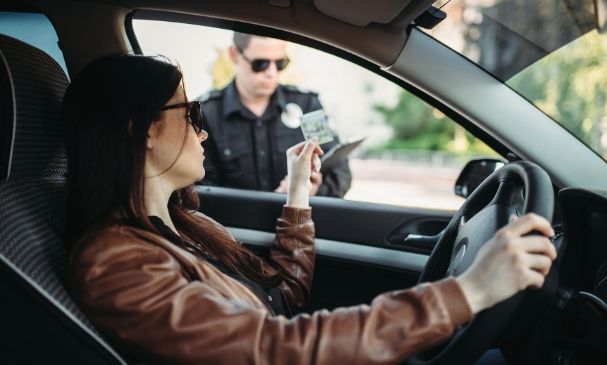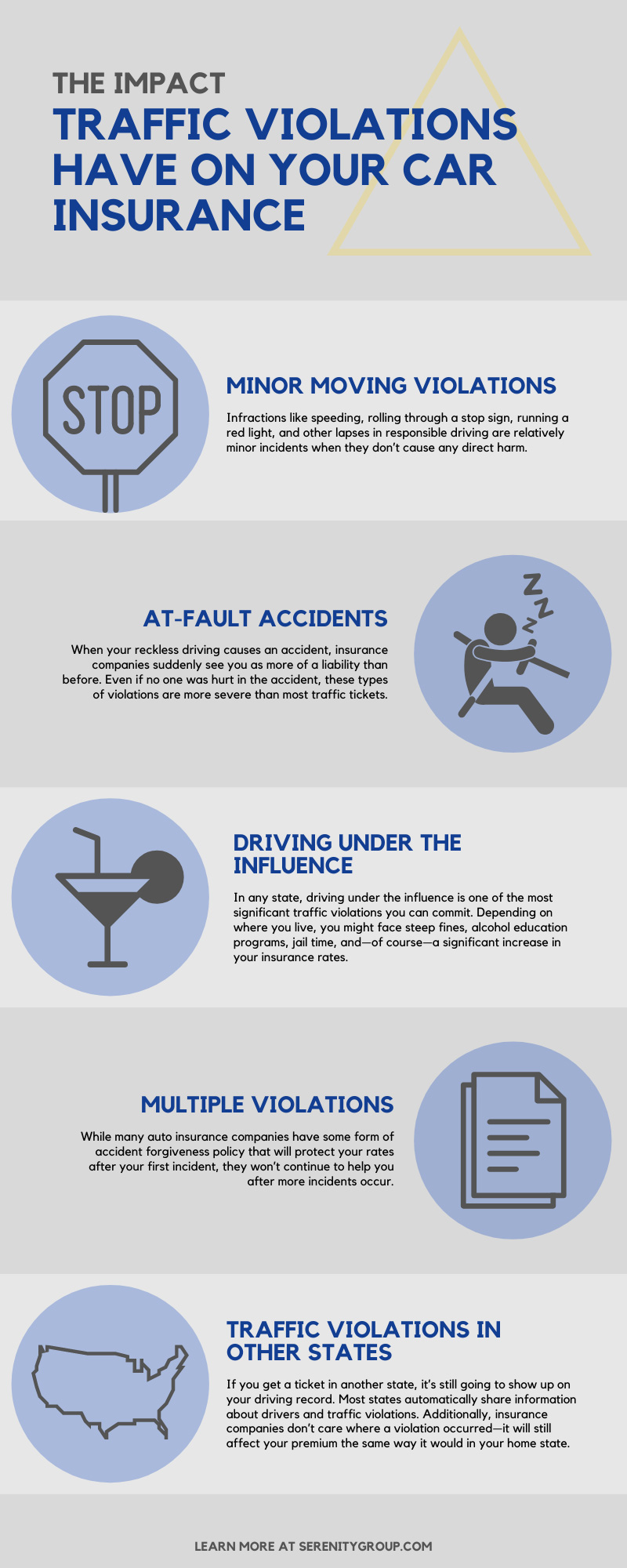The Impact Traffic Violations Have on Your Car Insurance

Even the best drivers make mistakes. Traffic violations are a relatively common part of life, and most of us receive a ticket at some point or another. Depending on where you live and what happened, these infractions can be anything from a minor inconvenience to a major disruption of your daily routine. Even if you pay the fine and return to your regular life on the road, that violation might come back to haunt you when you get your next auto insurance bill. Car insurance companies use your driving record to determine how high-risk you are as a driver. When you commit a traffic violation—even a minor one—your insurance provider will consider you to be a higher-risk driver and therefore more likely to cost them money. As such, how you act on the road plays a big role in how insurance companies determine your rates. Find out more about the impact traffic violations have on your car insurance with this guide so you can better prepare yourself and your finances if something does happen.
How Do Traffic Violations Influence Car Insurance?
Like many other aspects of driving laws and insurance, the impact traffic violations have on your car insurance depends on your unique circumstances. Every state and insurance company has different policies regarding driving infractions and insurance rates. Additionally, each type of violation brings different consequences. For example, while some insurance providers might overlook a minor moving violation, they won’t be nearly as lenient with an at-fault accident. Most auto insurance companies review your driving record every time your policy is up for renewal. If they see a new traffic violation as a sign that you’re a higher-risk driver—and therefore potentially more expensive to insure—you will see an increase in your insurance premium. It’s important to review and understand your policy when you purchase auto insurance so you know how each different type of accident or violation will potentially affect you.
Minor Moving Violations
Not all traffic violations are equal; there are some moving violations that are less severe or harmful than others. Infractions like speeding, rolling through a stop sign, running a red light, and other lapses in responsible driving are relatively minor incidents when they don’t cause any direct harm. However, you’re still putting other drivers at risk when you commit these violations, so there are consequences you have to face. Once again, these consequences will vary depending on the severity of your actions. For example, if you get a speeding ticket for going more than 15 miles per hour over the limit, you’re more likely to see your insurance rate spike than if you’d received a ticket for a lower speed. Your driving experience might also play into how your insurance provider reacts to a minor violation. If you’re a teen driver who hasn’t been behind the wheel for that long, a speeding ticket or other minor violation will probably impact you more than if you have years of responsible driving under your belt.
At-Fault Accidents
When your reckless driving causes an accident, insurance companies suddenly see you as more of a liability than before. Even if no one was hurt in the accident, these types of violations are more severe than most traffic tickets. As a result, insurance providers take them more seriously. Auto insurance companies can see accidents on your record longer than they can see other moving violations. As such, an at-fault accident can continue to raise your insurance rates for several years, even if you change your policy or provider. Fortunately, many auto insurance companies offer potential discounts for drivers who provably drive safely and responsibly after their accident. These discounts can help reduce your insurance premium once more or even shorten the amount of time the incident stays on your insurance record.
Driving Under the Influence
In any state, driving under the influence is one of the most significant traffic violations you can commit. There are a lot of consequences that can come from a DUI. Depending on where you live, you might face steep fines, alcohol education programs, jail time, and—of course—a significant increase in your insurance rates. You might also lose your license and have to obtain SR22 insurance in order to reinstate it. The SR22 is an add-on to your insurance policy that acts as a guarantee to the state that you’re meeting your auto insurance requirements. If you have to acquire SR22 insurance after a DUI or other serious traffic violation, it’s important to look at the different insurance companies that offer SR22 policies. Shopping around can help you find a better deal rather than an insurance policy that will cost you an extraordinary amount of money.
Multiple Violations
No matter what kind of violation you commit, it will add up if you keep getting multiple infractions. While many auto insurance companies have some form of accident forgiveness policy that will protect your rates after your first incident, they won’t continue to help you after more incidents occur. As the number of your traffic violations increases, so will your insurance premium. After multiple incidents—especially severe ones like reckless driving or driving under the influence—your insurance company might even refuse to cover you altogether.
Traffic Violations in Other States
If you get a ticket in another state, it’s still going to show up on your driving record. Most states automatically share information about drivers and traffic violations. Additionally, insurance companies don’t care where a violation occurred—it will still affect your premium the same way it would in your home state. The biggest difference is that you’ll have to deal with multiple states’ driving laws and consequences. If you get a ticket while driving in another state, make sure you pay the fine and meet all other requirements to keep your license and minimize the damage to your record.
How to Deal With Increased Premiums
If you’re facing increased auto insurance rates because of a traffic violation, there are a few things you can do to keep the costs as low as possible. One of the best ways to combat high insurance rates is by being a safe and responsible driver at all times. You can also take this a step further by taking defensive driving lessons and other traffic school courses through your DMV. These courses also go on your driving record and help insurance providers see you as a more responsible driver. You should also look into any discounts for your policy. Good student, bundled policies, and organization benefits can all help lower your insurance rates, balancing out some of the damage a traffic violation might cause.


Recent Comments